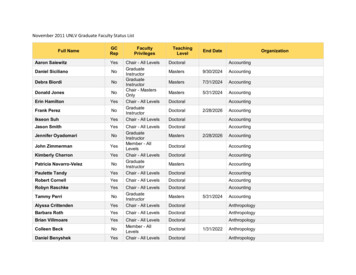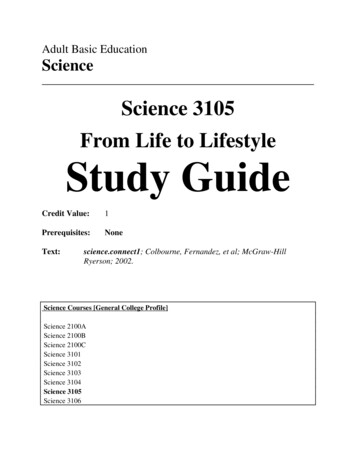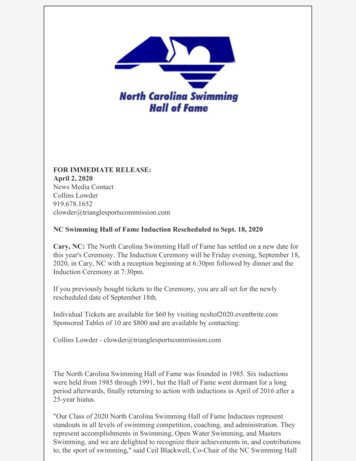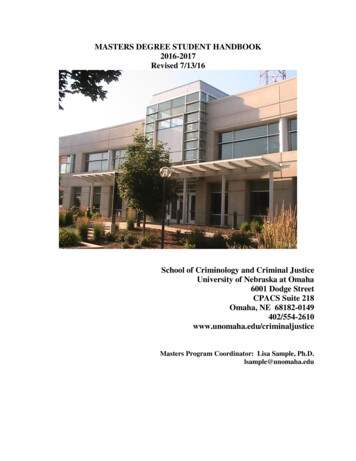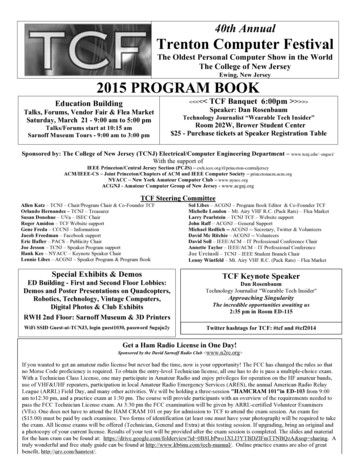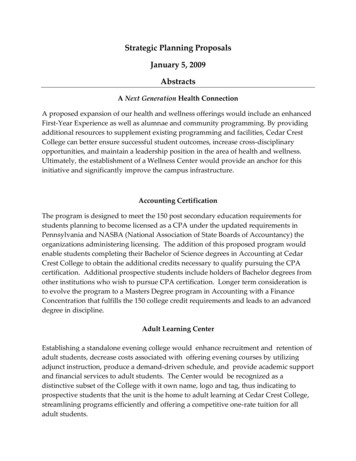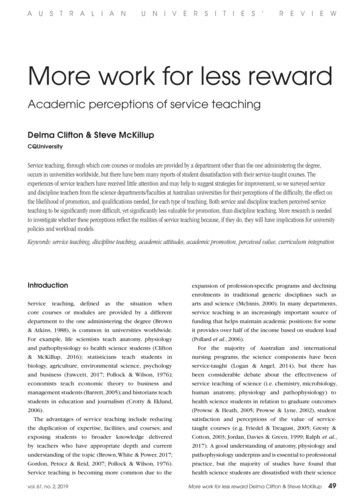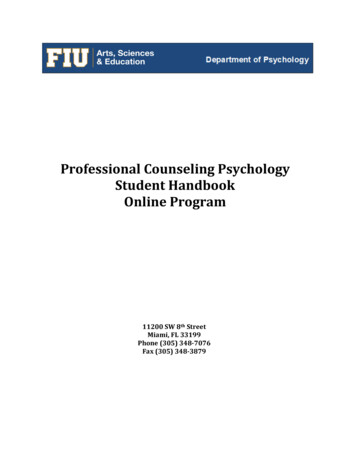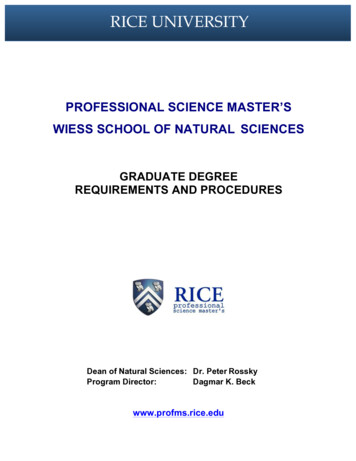
Transcription
RICE UNIVERSITYPROFESSIONAL SCIENCE MASTER’SWIESS SCHOOL OF NATURAL SCIENCESGRADUATE DEGREEREQUIREMENTS AND PROCEDURESDean of Natural Sciences: Dr. Peter RosskyProgram Director:Dagmar K. Beckwww.profms.rice.edu
RICE PROFESSIONAL SCIENCE MASTER’STABLE OF CONTENTSPROGRAM OVERVIEW . 2GENERAL DEGREE REQUIREMENTS . 3The Coordinated PSM/MBA Program Option: . 4APPLIED CHEMICAL SCIENCES DEGREE . 6BIOSCIENCE AND HEALTH POLICY DEGREE . 8ENVIRONMENTAL ANALYSIS DEGREE . 11SUBSURFACE GEOSCIENCE DEGREE . 13SPACE STUDIES DEGREE . 16COHORT COURSES . 19PROFESSIONAL DEVELOPMENT PROGRAM . 20STUDENT ADVISING . 22INTERNSHIP PROGRAM . 23B.Finding an Internship Position . 24C.Internship Evaluation . 25PROJECT REPORTS AND PRESENTATION . 26GENERAL INSTRUCTIONS FOR ALL PROGRAMS . 26Environmental Analysis Internship Report . 29Bioscience and Health Policy Internship Report . 33Space Studies Internship Report . 35Subsurface Geoscience Internship Report . 39MANAGEMENT ELECTIVES . 43OTHER REGULATIONS . 44Consult the Rice University General Announcementson-line at http://ga.rice.edu/for additional information or changes.
RICE PROFESSIONAL SCIENCE MASTER’SPROGRAM OVERVIEWThe Wiess School of Natural Sciences offers five degrees through the Professional ScienceMaster’s Program.The Master of Science in Applied Chemical Sciences bridges advance science with businessand management. It offers focus areas in bio-organic chemistry, computational chemistry and datascience, and petroleum chemistry for employment in chemical related fields.The Master of Science in Bioscience and Health Policy provides skills needed for work in bioscientific, health-related industries and governmental organizations. It aims to build leaders inscience and health policy who will create, promote, and integrate science, medicine. and practice.The Master of Science in Environmental Analysis focuses on the methods needed by industrialand governmental organizations to deal with environmental issues.The Master of Science in Subsurface Geoscience is geared for students who would like tobecome proficient in applying geological knowledge, geophysical methods and/or datamanagement to finding, managing and developing reserves of oil and natural gas.The Master of Science in Space Studies combines study of space engineering, aerospace, andlife sciences, with courses in management, business and communication. It will trainscientists/engineers to face challenges in human/robotic space exploration and space policy.The curriculum for all professional science master’s degrees consists of required science courses,electives, cohort courses, and a three to six month internship. This combination should enable thestudent to apply her/his scientific education in an industry environment.
RICE PROFESSIONAL SCIENCE MASTER’SGENERAL DEGREE REQUIREMENTSEach degree consists of science core courses, cohort courses, elective courses, and a threeto six month internship. Students must complete two reports on the internship experience andgive a presentation during the Professional Master’s Seminar.Professional Science Master’s students must take approximately 39 semester hours ofupper level courses (30 credit hours have to be at the 500-level or higher); the total hoursdepends upon the chosen degree and courses selected. At least 24 semester hours must becompleted at Rice. Students who have already taken courses substantially similar to any of therequired courses (and have not used them for another degree) may request to transfer up to 9credit hours from a former institution. This process requires that students submit a memo andcopies of all relevant transcripts and course syllabi to the program committee. Each case mustbe individually approved by the program committee.Students must maintain a B- (2.67) grade point average in courses counted toward thegraduate degree. Students whose GPA falls below 2.67 are placed on probationary status.Students on probationary status will not be approved for an intern position or graduation.The general timeline for these degrees is three semesters of study to complete the requiredcoursework, plus a 3 to 8 month internship/work experience. Full-time students should be ableto finish the degree in two years, part-time students usually finish within 3 to 3 1/2 years. Theuniversity allows a maximum of 5 years to complete a master’s degree.Students develop a study plan before entering the program that details the course work theyare planning to pursue during their studies at Rice. The study plan is reviewed with advisingfaculty and adjusted over time to adapt to any changes in course offerings and career goals ofstudent.Professional Science Master’s 5th Year Degree Option for Rice Undergraduates:Rice students have an option to pursue a Professional Science Master’s degree back-toback with the Bachelor’s degree by adding just one more year of graduate studies to the fourundergraduate years of science studies. Advanced Rice students in good standing apply duringtheir junior year and then start taking required core courses of the respective program duringtheir senior year in addition to finalizing their undergraduate requirements. Note that a specificcourse completed can be counted toward only one degree. Once all requirements for theundergraduate degree are completed, the student will matriculate into the master’s degreeprogram. A plan of study based on their specific focus area will need to be approved by thetrack director and the PSM director. Students should be aware that there could be financial aidimplications if the conversion of undergraduate coursework to that of graduate level reducestheir earned undergraduate credit for any semester below that of full-time (12 hours) status.
RICE PROFESSIONAL SCIENCE MASTER’SThe Coordinated PSM/MBA Program Option:(not yet available for the Applied Chemistry Sciences degree)In order to offer a deeper immersion into management and business acumen, theProfessional Science Master’s Program at Rice has collaborated with the Rice Jones GraduateSchool of Business to offer an integrated PSM/MBA study option. Applications to both programshave to be received at the same time. According to the Professional Science Master’s trackfocus, graduates are qualified for leadership roles in industries related to the environment,nanotechnology, energy and government.This coordinated degree program can be completed in 2 1/2 to 3 years. This dual degreeincludes a total of 45 hours of course work in business management and 30 credit hours in thechosen PSM track. Students will complete the same core requirements as the students in theregular MBA and PSM programs. Successful graduates from both degree programs will receivea Master of Science and a MBA degree.Admission RequirementsTo enter this coordinated degree program, applicants must apply and be accepted by both theJones School of Business (JGSB) and one of the following Weiss School of Natural SciencesProfessional Science Master’s (PSM) programs: Bioscience and Health Policy, EnvironmentalAnalysis and Decision Making, Subsurface Geoscience, or Space Studies. The programrequires the JGSB application, two letters of recommendation, and the GRE.Degree RequirementsStudents may earn a Master of Science degree from the Wiess School of Natural Sciences’Professional Science Master’s program in the following fields: (1) Bioscience and Health Policy,(2) Environmental Analysis and Decision Making, (3) Subsurface Geoscience, and (4) SpaceStudies. Ordinarily, both the PSM and the MBA each take two academic years to complete.Coordinated degree candidates are required to fulfill a minimum of 5 full time, consecutivesemesters (2.5 academic years). In rare cases, a sixth semester may be necessary; however,the standard progression is as follows and students must maintain the academic pace set out bytheir coordinated degree plan: PSM: a minimum of two consecutive full time semesters MBA: a minimum of three consecutive full time semestersFor the coordinated MBA/Master of Science degree from the Professional Master’s program,students must fulfill the following minimum requirements: 75 credit hours of course work including at least 30 credits in a science discipline and 45credits of business course work Satisfy all MBA core curriculum requirements Satisfy all Professional Masters MS track-specific requirements
RICE PROFESSIONAL SCIENCE MASTER’S Meet with the Coordinated-Degree Advisory Team each semester for academic advisingand progress reviewSummer internships are requiredAll requirements must be fulfilled within a maximum of three full time academic yearsAt the MBA and PSM discretion, a standard maximum of 6 credit hours of pre-degree-entrycoursework may be transferred into the coordinated-degree. Students are not permitted,however, to take any MBA core courses prior to their official entry into the program.Special circumstances (e.g., medical condition, familial obligation, et al.) can arise during astudent’s academic career, which may require a temporary halt to academic pursuits (leave ofabsence or temporary withdrawal). In such cases, students are required to submit a writtenappeal with supporting documentation (if applicable) requesting a leave of absence ortemporary withdrawal. If jointly approved, a revised degree plan will be developed upon thestudent’s return to the program. In the case of an approved academic leave of absence ortemporary withdrawal, reenrollment must occur within three academic years from departure, andstudents are still expected to graduate with the coordinated degree within a maximum of five tosix full time semesters.Program Cost StructureThe following is the standard tuition structure: MBA: a minimum of three consecutive (Fall, Spring, Fall) semesters. PSM: a minimum of two consecutive (Fall, Spring) semesters.In rare cases a student may extend the program an additional sixth semester. The cost will betreated as follows: If a student enrolls in only PSM courses, then that semester’s tuition will be the PSM rate. If a student enrolls in MBA or a combination of MBA/PSM courses, then that semester’stuition will be the MBA rate.Scholarship funding may be awarded to a coordinated-degree student by one or both of theprograms. In the case of MBA scholarships, funding eligibility is merit-based and determined atthe point of admission into the program. In the case of PSM scholarships, funding may beawarded at the point of admission into the program or to current students. This funding is meritbased and determined through a holistic review of the quality of the application or the academicexcellence of the current student. A scholarship given by a program is only available to thestudent during those semesters that the student is billed for that program’s tuition (Example: AnMBA scholarship is only available during the semesters MBA tuition is billed).Due to changes in tuition and fees from one academic year to the next, students returning froma leave of absence or temporary withdrawal will be billed at the current class rate for MBAand/or at the current academic year rate for PSM.
RICE PROFESSIONAL SCIENCE MASTER’SAPPLIED CHEMCICAL SICENCES DEGREEGraduate students in Applied Chemical Sciences program will take the following courses:Required CoreCHEM 5XXCHEM 5XXCHEM 6XXCourses (9 credit hours):SEMINAR COURSESTATISTICAL ANALYSISRESEARCH EXPERIENCERequired Cohort Courses (9 credit hours):NSCI 501PROFESSIONAL MASTER'S SEMINAR (2 semesters required)NSCI 501PROFESSIONAL MASTER'S SEMINAR (2 semesters required)NSCI 511SCIENCE POLICY, AND ETHICSNSCI 512PROFESSIONAL MASTER'S PROJECTNSCI 610MANAGEMENT FOR SCIENCE AND ENGINEERINGIn addition to the courses listed above, students will pick from one of the areas ofspecialization below and choose 4 courses (12 credit hours) from the areaBioorganic Chemistry Focus Area: Select 4 courses (12 credit hours) from the following:CHEM 501ADVANCED ORGANIC CHEMISTRYCHEM 511SPECIAL METHODS ORGANIC CHEMISTRYCHEM 542MEDICINAL CHEMISTRYCHEM 552CHEMCIAL BIOLOGYCHEM 548PEPTITDE CHEMISTRY AND CHEM 554 DRUG DISCOVERYCHEM 547SUPRAMOLECULAR CHEMISTRYComputational Chemistry and Data Science Focus Area: Select 4 courses (12 credit hours)from the following:CHEM 523MOLECULAR DYNAMICS METHODS FROM STATISTICAL (1.5 credits)CHEM 551BIOMOLECULAR CONCEPTSCHEM 537BIOPHYSICAL CHEMISTRYCHEM 515CHEMICAL KINETICSCHBE 505ADVANCED NUMERICAL METHODSSTAT 532FOUNDATIONS OF STATISTICAL INTERFENCE ISTAT 533FOUNDATIONS OF STATISTICAL INTERFENCE IISTAT 535DATA SCIENCE PROJECTSPetroleum Chemistry Focus Area: Select 4 courses (12 credit hours) from the following:CHEM 533NANOSCIENCE AND NANOTECHNOLOGYCHEM 511SPECIAL METHODS ORGANIC CHEMISTRYCHEM 547SUPRAMOLECULAR CHEMISTRYCHEM 520CLASSICAL AND STAT THERMODYNAMICSCHEM 5XXNEW LAB COURSECHBE 505ADVANCED NUMERICAL METHODSCHBE 550PETROLEUM PHASE BEHAVIOR AND FLOW ASSURANCEESCI 544HYDROCARBON EXPLORATION
RICE PROFESSIONAL SCIENCE MASTER’SA 3 - 6 months internship: Practical experience is offered via a 3 - 6 month work immersion.The internship will be under the guidance of a host company, government agency, or non-profitorganization. A summary of the internship project is required in both oral and written form aspart of the Professional Master’s Seminar.Select a minimum of 9 credit hours from the following or others as available:ENGI 515ENGI 614ENGI 542ESCI 549MGMT 610MGMT 625MGMT 633MGMT 676MGMT 678MGMT 686MGMT 689MGMT 717MGMT 771MGMT 747LEADING TEAMS AND INNOVATIONLEARNING HOW TO INNOVATECOMMUNICATION FOR ENGINEERS/SCIENTISTSDATA MANAGEMENT AND GOVERNANCEFUNDAMENTALS FOR THE ENERGY INDUSTRYDESIGN THINKINGROLES OF PHYSICIANS, SCIENTISTS, ENGINEERS IN HIGH-TECH STARTUPSSOCIAL ENTERPRISEUS HEALTH CARE MANAGEMENTINTRODUCTION TO MARKETING RESEARCHDECISION MODELSPROJECT MANAGEMENTDIGITAL MARKETINGREGULATORY ENVIRONMENT OF BUSINESSor others .TOTAL REQUIRED CREDIT HOURS: 39
RICE PROFESSIONAL SCIENCE MASTER’SBIOSCIENCE AND HEALTH POLICY DEGREEGraduate students in the Bioscience and Health Policy program will take the following courses:Four Required Bioscience Classes: The Bioscience courses give in-depth instruction inspecialized areas of Bioscience. Four courses are required to obtain a broad understanding ofdiverse areas of cutting edge Bioscience research.Select 12 credit hours from below as available: (Please note that not all classes are offeredevery year and courses maybe cancelled or added)Check availability on the Registrar’s Office Course Schedule siteBIOS 523BIOS 524BIOS 525BIOS 543BIOS 547BIOS 549BIOS 520BIOS 550BIOS 560BIOS 570BIOS 572BIOS 585CONSERVATION BIOLOGYMICROBIOLOGY & BIOTECHNOLOGYPLANT MOLECULAR GENETICS AND DEVELOPMENTDEVELOPMENTAL NEUROBIOLOGYEXPERIMENTAL BIOLOGY AND THE FUTURE OF MEDICINEADVANCED CELL AND MOLECULAR NEUROSCIENCEMOLECULAR BASIS OF DISEASESVIRUSES AND INFECTIOUS DISEASESCANCER BIOLOGYCOMPUTATION WITH BIOLOGICAL DATAIMMUNOLOGYFUNDAMENTALS OF CELLULAR AND MOLECULAR NEUROSCIENCENote: Other courses can be chosen with approval of advising facultyRequired Cohort Courses (9 credit hours):NSCI 501PROFESSIONAL MASTER'S SEMINAR (2 semesters required)NSCI 501PROFESSIONAL MASTER'S SEMINAR (2 semesters required)NSCI 511SCIENCE POLICY, AND ETHICSNSCI 512PROFESSIONAL MASTER'S PROJECTNSCI 610MANAGEMENT FOR SCIENCE AND ENGINEERINGFour Statistics, Economics, and Policy Courses:The analytical competency requirement provides career-enhancing, marketable skills in policyanalysis, economics and statistics. Students will take courses from groups A, B and C asindicated below:A – Select one course related to Statistics / Data Analytics (a minimum of 3 credit hours)BIOE 552INTRO COMPUTATIONAL SYSTEMS BIOLOGYESCI 571DATA SCIENCE METHODS AND DATA MANAGEMENTESCI 654GEOGRAPHIC INFORMATION SCIENCEBIOS 538BIO DATA ANALYSISSTAT 553BIOSTATISTICSSTAT 605R FOR DATA SCIENCE
RICE PROFESSIONAL SCIENCE MASTER’SB – Select OneMGMT 631MGMT 678MGMT 690MGMT 751MGMT 793PH 3910*Economics/Finance Course (a minimum of 3 credit hours)HEALTH INSURANCE IN THE U.S.: THE ESSENTIALSBUSINESS OF HEALTHCAREHEALTHCARE STRATEGYECONOMICS OF HEALTH CARE SECTORSCREATING THE DATA DRIVEN BUSINESSINTRODUCTION TO HEALTH ECONOMICSC – Select TwoANTH 581ANTH 643HEAL 580MGMT 631MGMT 690MGMT 691NSCI 530SOPA 540SOCI 525Policy Courses (a minimum of 6 credit hours)MEDICAL ANTHROPOLOGYANTHROPOLOGY OF RACE, ETHNICITY AND HEALTHDISPARITIES IN HEALTH IN AMERICAHEALTH INSURANCE IN THE U.S.: THE ESSENTIALSHEALTHCARE STRATEGYBREAKTHROUGH NEGOTIATIONS IN A HEALTH CARE CONTEXTTHE SHAPING OF HEALTH POLICYINTRO TO PANDEMIC RESPONSEPOPULATION HEALTH SEMINARA 3 - 6 months internship: Practical experience is offered via a 3 - 6 month work immersion.The internship will be under the guidance of a host company, government agency, or non-profitorganization. A summary of the internship project is required in both oral and written form aspart of the Professional Master’s Seminar.Minimum of Two Elective CoursesThe electives reflect individual academic interests and career goals. Any course from the abovelist of courses can be taken as an elective, provided it was not taken as a required course. Inaddition, the following classes qualify as elective classes:Select a minimum of 6 credit hours from the following or others as available:ENGI 529ENGI 614ENGI 615HEAL 507HEAL 560MGMT 623MGMT 633MGMT 712MGMT 721MGMT 744MGMT 778MGMT 793MGMT 799PHIL 536ETHICS AND ENGINEERING LEADERSHIPLEARNING HOW TO INNOVATE?LEADERSHIP COACHING FOR ENGINEERSEPIDEMIOLOGYPLANNING AND EVALUATION OF HEALTH PROMOTION AND EDUCATIONEARLY DEVELOPMENT & ENTREPRENEURSHIP IN A BIOTECH STARTUPROLES OF PHYSICIANS, SCIENTISTS, ENGINEERS IN HIGH-TECH STARTUPSPROCESS MANAGEMENT AND QUALITY IMPROVEMENTBUSINESS LAWSERVICES OPERATIONSCUSTOMER EXPERIENCE MANAGEMENTCREATING THE DATA DRIVEN BUSINESSHEALTHCARE INNOVATION AND ENTREPRENEURSHIPTOPICS IN MEDICAL ETHICSTOTAL REQUIRED CREDIT HOURS: 39
RICE PROFESSIONAL SCIENCE MASTER’SNote: An individual course may not be not offered every year, and some courses may havepre-requisites or require instructor permission.*Students can also choose electives from courses offered at UT Graduate School of BiomedicalSciences (GS), Health Science Center (PH), and UT School of Biomedical Informatics (HI) aslisted above.Please note:The General Announcements (GA) is the official source for the Rice curriculum. In the eventthat there is a discrepancy between the GA and any other websites or publications, the GA shallprevail as the authoritative source.
RICE PROFESSIONAL SCIENCE MASTER’SENVIRONMENTAL ANALYSIS DEGREEGraduate students in the Environmental Analysis program will take the following courses:Please note that not all classes are offered every year and courses maybe cancelled or addedCheck availability on the Registrar’s Office Course Schedule site - substitutions can beapproved by the faculty advisor.Required Science Core CoursesCEVE 501 ORCEVE 510CHEMISTRY FOR ENVIRONMENTAL ENGINEERING & SCIENCEPRINCIPLES OF ENVIRONMENTAL ENGINEERINGBIOS 571STAT 685ECOSYSTEM MANAGEMENT - OverviewENVIRONMENTAL STATISTICS AND DECISION MAKINGRequired Cohort Courses (9 credit hours):NSCI 501PROFESSIONAL MASTER'S SEMINAR (2 semesters required)NSCI 501PROFESSIONAL MASTER'S SEMINAR (2 semesters required)NSCI 511SCIENCE POLICY, AND ETHICSNSCI 512PROFESSIONAL MASTER'S PROJECTNSCI 610MANAGEMENT FOR SCIENCE AND ENGINEERINGElective CoursesStudents will choose 21 credit hours elective of courses from the following three focus areasand satisfying the following requirements:3 credit hours from subject code CEVE (Civil and Environmental Engineering)3 credit hours from subject code BIOS (Ecology and Evolutionary Biology)3 credit hours from subject code STAT (Statistics)one course (3 credits) from the Management and Policy focus area, and threecourses (9 credits) from one focus area.EnvironmentalCEVE 501CEVE 502CEVE 507CEVE 508CEVE 509CEVE 511CEVE 518CEVE 520CEVE 523CEVE 534CEVE 535CEVE 536CEVE 550BIOS 523Sustainability Focus AreaCHEMISTRY FOR ENVIRONMENTAL ENGINEERING AND SCIENCESUSTAINABLE DESIGNENERGY AND THE ENVIRONMENTINTRODUCTION TO AIR POLLUTION CONTROLHYDROLOGY AND WATER RESOURCES ENGINEERINGATMOSPHERIC PROCESSESENVIRONMENTAL HYDROGEOLOGYENVIRONMENTAL REMEDIATION RESTORATIONAPPLIED SUSTAINABLE PLANNING AND DESIGNFATE AND TRANSPORT OF CONTAMINANTS IN THE ENVIRONMENTPHYSICAL CHEMICAL PROCESSES FOR WATER QUALITY CONTROLENVIRONMENTAL BIOTECHNOLOGY AND BIOREMEDIATIONENVIRONMENTAL ORGANIC CHEMISTRYCONSERVATION BIOLOGY
RICE PROFESSIONAL SCIENCE MASTER’SBIOS 532BIOS 560BIOS 563BIOS 568BIOS 569BIOS 572BIOS 580DSCI 535BIOS 595ESCI 618ESCI 699ECOLOGYSUSTAINABILITY IMPACTSTOPICS IN ECOLOGYTOPICS IN BIOLOGICAL DIVERSITYCORE COURSE IN ECOLOGY AND EVOLUTIONARY BIOLOGYCORAL REEF ECOSYSTEMSSUSTAINABLE DEVELOPMENT AND REPORTINGAPPLIED MACHINE LEARNING AND DATA SCIENCE PROJECTSTOPICS IN ENVIRONMENTAL SCIENCEQUANTITATIVE HYDROGEOLOGYGRAPHIC AND VISUAL DESIGN FOR SCIENTISTSManagement and Policy Focus AreaCEVE 506INTRO TO ENVIRONMENTAL LAWCEVE 528ENGINEERING ECONOMICSCEVE 529ETHICS AND ENGINEERING LEADERSHIPESCI 617PETROLEUM INDUSTRY ECONOMICS AND MANAGEMENTGLBL 543ENERGY POLICYMGMT 609MANAGING ENERGY TRANSITIONSMGMT 610FUNDAMENTALS OF THE ENERGY INDUSTRYMGMT 661INTERNATIONAL BUSINESS LAWMGMT 670OPERATIONS STRATEGYMGMT 676SOCIAL ENTERPRISEMGMT 721BUSINESS LAWQuantitative Decision-Making Focus AreaBIOS 538BIO DATA ANALYSISCEVE 528ENGINEERING ECONOMICSDSCI 535APPLIED MACHINE LEARNING AND DATA SCIENCE PROJECTSESCI 654GEOGRAPHIC INFORMATION SCIENCEESCI 699GRAPHIC AND VISUAL DESIGN FOR SCIENTISTSSTAT 553BIOSTATISTICSSTAT 605 OR R FOR DATA SCIENCESTAT 606SAS STATISTICAL PROGRAMMINGSTAT 615REGRESSION AND LINEAR MODELSInternship:A three to six month internship under the guidance of a host company, government agency ornational laboratory is required. At the conclusion of this internship, students must present theirinternship project in both oral and written form as part of the Professional Master’s Project.TOTAL REQUIRED CREDIT HOURS: 39NOTE: Some listed courses may not be offered every year, and others may be offered thatsatisfy the requirements with pre-approval. Students should consult with their academicadvisors before enrolling.Also please note:The General Announcements (GA) is the official Rice curriculum. In the event that there is adiscrepancy between the GA and any other websites or publications, the GA shall prevail as theauthoritative source.
RICE PROFESSIONAL SCIENCE MASTER’SSUBSURFACE GEOSCIENCE DEGREEThere are three focus areas in the Subsurface Geoscience track:Energy Data Management, Geology, and GeophysicsPlease note that not all classes are offered every year and courses maybe cancelled or added.Check availability on the Registrar’s Office Course Schedule siteCore Requirements for all 3 Specializations (12-13 credit hours):ESCI 549DATA MANAGEMENT AND DATA GOVERNANCEESCI 5583D SEISMIC REFLECTION DATA INTERPRETATIONESCI 636WELL LOGGING AND PETROPHYSICSESCI 615 OR DECISION MAKING AND ECONOMICS IN THE ENERGY INDUSTRYESCI 545HYDROCARBON SYSTEMS ANALYSIS*Prerequisite or co-requisite: ESCI 442/642 Exploration GeophysicsRequired Cohort Courses (9 credits):NSCI 501PROFESSIONAL MASTER'S SEMINAR (2 semesters required)NSCI 501PROFESSIONAL MASTER'S SEMINAR (2 semesters required)NSCI 511SCIENCE POLICY, AND ETHICSNSCI 512PROFESSIONAL MASTER'S PROJECTNSCI 610MANAGEMENT FOR SCIENCE AND ENGINEERINGENERGY DATA MANAGMENT FOCUS AREA:Required Courses (9 credit hours)ESCI 530DATA SCIENCE ENVIRONMENTAL AND GEOSCIENCESESCI 570COMPUTATIONAL AND DATA SCIENCE IN THE ENERGY INDUSTRYESCI 571DATA SCIENCE METHODS AND DATA MANAGEMENTStudents will choose 9 credit hours from the following electives:CEVE 528ENGINEERING ECONOMICSCOMP 543GRADUATE TOOLS AND MODELS - DATA SCIENCECOMP 556INTRODUCTION TO COMPUTER NETWORKSDSCI 535APPLIED MACHINEN LEARNING AND DATA SCIENCE PROJECTSESCI 557SPECIAL TOPICS IN EARTH SCIENCE : UnconventionalsECON 601ENERGY ECONOMICS IESCI 652GIS FOR SCIENTISTS AND ENGINEERSGLBL 543ENERGY POLICYMGMT 610FUNDAMENTALS OF THE ENERGY INDUSTRYMGMT 616ENERGY MARKET ORGANIZATIONMGMT 661INTERNATIONAL BUSINESS LAWMGMT 670OPERATIONS STRATEGYMGMT 676SOCIAL ENTERPRISESTAT 518PROBABILITY .and others
RICE PROFESSIONAL SCIENCE MASTER’SGEOLOGY FOCUS AREA:Required Courses (6 credit hours)ESCI 626 OR INTRO TO SEISMIC INTERPRETATIONESCI 663STRUCTURE AND EVOLUTION OF TECTONIC SYSTEMSESCI 627 OR SEQUENCE STRATIGRAPHYESCI 504SILICICLASTIC DEPOSITIONAL SYSTEMS (not offered 20/21)Students will choose 12 credit hours from the following electives:ESCI 334FIELD METHODSESCI 507APPLIED SEDIMENTOLOGY IIESCI 527SEMINAR: QUANTITATIVE PETROLEUM SYSTEMS ANALYSIS 2ESCI 544HYDROCARBON EXPLORATIONESCI 545HYDROCARBON SYSTEMS ANALYSISESCI 557SPECIAL TOPICS IN EARTH SCIENCE : UnconventionalsESCI 564SEISMIC REFLECTION DATA PROCESSESCI 626INTRODUCTION TO SEISMIC INTERPRETATIONESCI 627SEQUENCE STRATIGRAPHYESCI 642EXPLORATION GEOPHYSICSESCI 652GIS FOR SCIENTISTS AND ENGINEERSESCI 661SEISMOLOGY IESCI 662TECTONOPHYSICS (S21)ESCI 663STRUCTURE AND EVOLUTION OF TECTONIC SYSTEMSESCI 664GLOBAL TECTONICS (S22)ESCI 665APPLIED ROCK PHYSICSESCI 672NUMERICAL METHODSMGMT 610FUNDAMENTALS OF THE ENERGY INDUSTRYMGMT 616ENERGY MARKET ORGANIZATIONNOTE: Some listed courses may not be offered every year, and others may be offered thatsatisfy the requirements with pre-approval. Students should consult with their academicadvisors before enrolling.GEOPHYSICS FOCUS AREA:Required Courses (9 credit hours)ESCI 640GEOPHYSICAL DATA ANALYSIS: DIGITAL SIGNAL PROCESSINGESCI 641GEOPHYSICAL DATA ANALYSIS: INVERSE METHODSStudents will choose 12 credit hours from the following electives:ESCI 334FIELD METHODSESCI 544HYDROCARBON EXPLORATIONESCI 545HYDROCARBON SYSTEMS ANALYSISESCI 557SPECIAL TOPICS IN EARTH SCIENCE : UnconventionalsESCI 564SEISMIC REFLECTION DATA PROCESSESCI 627SEQUENCE STRATIGRAPHYESCI 642EXPLORATION GEOPHYSICSESCI 652GIS FOR SCIENTISTS AND ENGINEERSESCI 661SEISMOLOGY IESCI 662TECTONOPHYSICS (S21)ESCI 663STRUCTURE AND EVOLUTION OF TECTONIC SYSTEMS
RICE PROFESSIONAL SCIENCE MASTER’SESCI 664ESCI 665ESCI 672MGMT 610MGMT 616GLOBAL TECTONICS (S22)APPLIED ROCK PHYSICSNUMERICAL METHODSFUNDAMENTALS OF THE ENERGY INDUSTRYENERGY MARKET ORGANIZATIONNOTE: Some listed courses may not be offered every year, and others may be offered thatsatisfy the requirements with pre-approval. Students should consult with their academicadvisors before enrolling.Internship:A three to six month internship under the guidance of a host company, government agency ornational laboratory is required. At the conclusion of this internship, students must present theirinternship project in both oral and written form as part of the Professional Master’s Project.TOTAL REQUIRED CREDIT HOURS: min. 39Please note:The General Announcements (GA) is the official Rice curriculum. In the event that there is adiscrepancy between the GA and any other websites or publications, the GA shall prevail as theauthoritative source.
RICE PROFESSIONAL SCIENCE MASTER’SSPACE STUDIES DEGREEGraduate students in the Space Studies program will take the following courses:Please note that not all classes are offered every year and courses maybe cancelled or added.Check availability on the Registrar’s Office Course Schedule siteRequired Core Science/Engineering Courses (9 credit hours)ASTR 570MECH 578STAT 605SOLAR SYSTEM PHYSICSORBITAL MECHANICS AND MISSION DESIGNR FOR DATA SCIENCEChoose two courses (6 credit hours) from the list below:ASTR 554ASTROPHYSICS OF THE SUNPHYS 517COMPUTATIONAL PHYSICSBIOC 540METABOLIC ENGINEERINGESCI 540EARTH'S ATMOSPHEREMECH 554COMPUTATIONAL FLUID MECHANICSMECH 592DESIGN FOR AEROSPACE ENVIRONMENTSRequired Cohort Courses: (9 credit hours)NSCI 501NSCI 501NSCI 511NSCI 512NSCI 610PROFESSIONAL MASTER'S SEMINAR (2
the standard progression is as follows and students must maintain the academic pace set out by their coordinated degree plan: PSM: a minimum of two consecutive full time semesters MBA: a minimum of three consecutive full time semesters For the coordinated MBA/Master of Science degree from the Professional Master's program,
